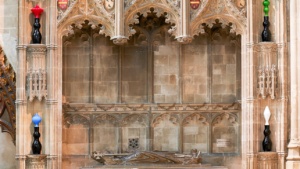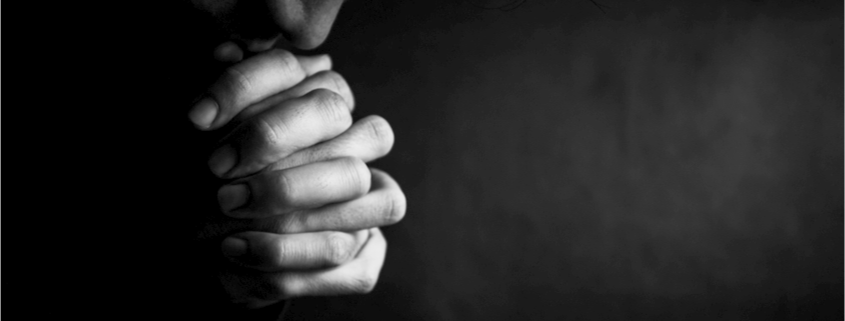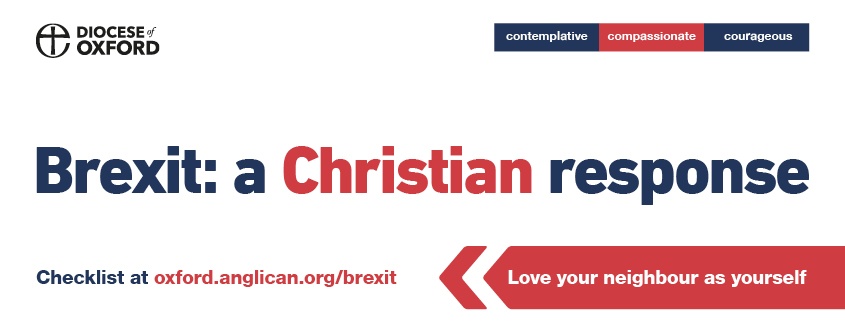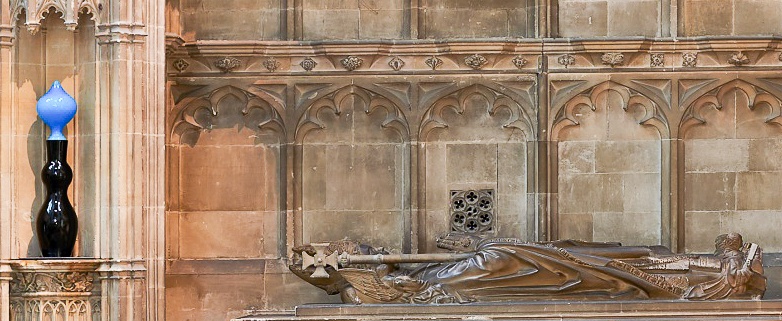A Presidential Address to the Oxford Diocesan Synod on Saturday 16 November. Read more
Posts
We may be about to exit the European Union and begin a new relationship with our European neighbours and with the world. +Steven, +Alan, +Colin and Bishop-elect Olivia have written a joint letter to every church, school and chaplaincy in the Diocese of Oxford reminding us all of the important roles that our churches and schools hold at this time. The bishops are encouraging parishioners across the diocese to read the letter too: “Don’t underestimate what we can achieve if every church, chaplaincy and school does something and if every Christian disciple takes some action, however small”.
Dear friends,
Love your neighbour as yourself: a Christian response to Brexit
“But seek the welfare of the city where I have sent you… and pray to the LORD on its behalf, for in its welfare you will find your welfare” (Jeremiah 29.7)
We are writing as bishops to every church, school and chaplaincy in the Diocese of Oxford and to every disciple at this critical moment in our national life.
As a nation we may be about to exit the European Union and begin a new relationship with our European neighbours and with the world. At the time of writing, the course of events is uncertain – and the prolonged uncertainty is itself challenging. How are we to respond in the coming months as the Church of England across Oxfordshire, Berkshire, Buckinghamshire and Milton Keynes?
Six hundred years before the birth of Christ, the prophet Jeremiah wrote to those sent into exile in Babylon. His words resonate powerfully today. We are to seek the welfare of our cities, towns and villages in these difficult months. The word translated welfare here is shalom: peace, well-being and prosperity. These must be our goal.
There are over a thousand churches, schools and chaplaincies in the Diocese of Oxford and over 50,000 regular worshippers. We are calling on everyone to remember the commandment to love our neighbours as ourselves, especially in the coming weeks. Together we can make a significant difference.
The Church of England and Brexit
Our nation is divided about our future relationship in Europe. Our calling as the Church in these times is not to take sides in this debate but to continue to be the Church for everyone. There are leavers and remainers in every congregation, but this can never be our primary identity as Christians.
We have a particular responsibility at this time to speak out for the poorest in our communities and to act to help them (as the church has always done). We have a responsibility to work for the peace and the common good. We are called to offer in public and in private a voice of truth and a voice for hope in the future. The Bishops of the Church of England made a public statement recently calling for listening, respect and renewal in political life.
As the Church we bring a long perspective on the present debates. We know from our own history that the United Kingdom has re-imagined its relationship with Europe many times in the past. The Church of England came into existence as part of one of these eras of change. In a few weeks, we will all remember again those who gave their lives in the great wars of the twentieth century which were focussed around conflict across Europe.
As the Church, our friendships with Europe and with the Church across Europe will continue and deepen whatever the political and economic settlement.
What can we do?
National and local government have done a great deal to plan for a smooth and orderly Brexit (with or without a deal). However, there is an important role at this time for practical expressions of love and hope by communities and individuals. The exact needs will vary from one parish or benefice to another. These are some of the things you may need to consider and think about as Church Councils, school governing bodies, small groups and families.
Twelve ways to love your neighbour as yourself, a Brexit checklist:
- Give extra support to the food banks in your area. There may be temporary shortages of some foods. Prices may rise. Foodbank usage may also rise. Signpost your local foodbank. Make sure stocks are high, and there are enough volunteers.
- Watch out for the lonely, the anxious and the vulnerable. Levels of fear are rising and may rise further. Knock on your neighbours doors and check if they are OK. Speak to people on the bus and at work. Build networks and friendships.
- Reach out to EU nationals in your neighbourhood and workplace. This is a moment for friendship and hospitality and love for the stranger. As we leave the European Union, or as the uncertainty continues, people are likely to feel less welcome.
- Make sure people have access to good advice on migration and travel, and qualified advice on debt and financial support. It may be possible to set up a temporary drop-in centre in Church for EU citizens or for UK citizens anxious about relatives abroad. Point people to relevant websites.
- Remember the needs of children and young people. Our schools and churches can be a place of balance and sanctuary for our children, who may be feeling upset and anxious. The Mental Health Foundation has excellent advice on talking to children about scary world news. Parents and teachers might want to use this as an opportunity to demonstrate how different media cover the same story.
- Support the statutory services. A lot of good, solid planning has been done by local authorities. Familiarise yourself with your local authority plans and point people to them. Meet with your local councillors and neighbourhood police officers.
- Think about the needs of particular groups in your area. Some parts of the diocese have large communities of migrant workers from a particular region. Other parts will want to focus on the farming industry and its need for seasonal workers. What are the local challenges where you live?
- Work together with other churches, faith communities and charities. There are some excellent examples of collaboration across the Diocese in foodbanks, debt counselling and night shelters. How else could we work in partnership?
- Invite the community together. Encouraging discussion about the rights and wrongs of Brexit is unlikely to be helpful. Gather people to listen to each other about what concerns them looking forward and how communities can be brought together despite acknowledged differences. Gatherings over a meal can be helpful as can skilled facilitation.
- Watch over other faith and minority ethnic communities. Hate crimes and crimes against other faiths increased after the 2016 referendum. Reconnect with the mosques, synagogues and gudwaras in your area.
- Encourage truthful and honest debate. The renewal of our politics will need to be local as well as national. Plan now to host hustings during the General Election campaign. Don’t be afraid of the political space but step into it with a message of faith, hope and love.
- Pray in public worship and private prayer for the healing of our political life, for wisdom for those who lead us, for reconciliation between communities and for stability in our government.
Don’t underestimate what we can achieve if every church, chaplaincy and school does something and if every Christian disciple takes some action, however small.
Don’t take on too much either: loving our neighbour through the Brexit process needs to be woven into everything we do anyway, not simply added into busy lives. Don’t be limited by this checklist – you might have even better ideas. If you do, spread them around.
There are more details and resources in a special section on the Diocesan website, where you can download “Twelve ways to love your neighbour” as a poster.
Together we are called to be a contemplative, compassionate and courageous church, to love our neighbours as ourselves in the months ahead and to pray and work for the wellbeing of our communities.
+Steven Oxford
+Colin Dorchester
+Alan Buckingham
Olivia, Bishop of Reading elect
7 October 2019
The Bishop of Oxford, the Rt Revd Steven Croft, spoke in the House of Lords yesterday as the House debated Further discussions with the European Union under Article 50 of the Treaty on European Union.
“My Lords, I always rise to speak in this Chamber with some fear and trepidation but never more so than today: not only because of the expertise, passion and conviction in this Chamber but also the jeopardy in which we find ourselves as a nation and a Parliament.
My journey through the Brexit process is that for seven years until the referendum year, I was the bishop in Sheffield and South Yorkshire, where some of the communities voted by almost 70% to leave the European Union. I moved shortly afterwards to the Diocese of Oxford, where the three counties, by and large, are significantly in favour of remain.
I suspect that historians will look back on this process and focus not so much on the calling of the referendum or even the referendum itself but on the long period of indecision and paralysis that has followed. I spent some time in Canterbury Cathedral some weeks ago and stood on the place where Thomas Becket was murdered. We were reminded in the cathedral of Eliot’s play Murder in the Cathedral. In his moment of great peril and jeopardy, Becket is visited by four tempters who, in the play, become his four assassins.
I think four significant temptations have grown in proportion to become dangerous assassins facing Parliament in the coming weeks.
The first is to allow our course to be shaped by self-interest and personal ambition. This Brexit debate has been marred from the beginning, it seems, by the narrow calculation of those hoping to gain or retain high office. From the perspective of the country, nothing has undermined trust in our politics more than this untrammelled ambition, which is apparent to all.
I do not single out a particular party or a section of a particular party. One of the dangers of our politics at present is that personal ambition is being put before the country and I think we need to draw that period to an end with great urgency, lest our politics and our confidence in democracy be damaged for a very long time. Conversely, nothing will restore trust in our politics more than putting the interests of the nation ahead of personal position.
The second temptation is to allow yourself to be swayed by narrow party interests and the pursuit of or retention of power in the short term. The issues at stake here are much greater than the rise and fall of particular parties or factions. We need our MPs and Peers to act in the greater national interest and for national unity. I would argue that Parliament needs to come together if the nation is to come together and emerge from this long period of division and introspection.
The third temptation is nostalgia—a romantic attachment to the past. It is wrong to imagine that we can reverse the effects of one referendum by another or go back to a time before the Brexit debates began, when all was well, or go back still further to a different age of independence and imagined glory. We cannot. We must deal with the world as it is, not as we would like it to be, and steer our course accordingly; the leadership that we offer will be judged by this measure.
The fourth and final temptation is idealism: in a world of difficult choices and necessary compromise, holding on to an ideal which is no longer tenable, whether it is a particular kind of leaving or remaining or something else. This, it seems to me, is currently the greatest barrier to positive cross-party consensus. A coming together across Parliament is impossible without the willingness to compromise, and one of the encouraging features of recent weeks has been cross-party engagement.
As others have said, there are huge issues facing our world and our country: climate chaos, care for the poorest, increasing equality and opportunity, our changing relationship with technology, and the challenge of social care and health funding. We cannot allow our national attention to be diverted from these issues by prolonging still further a series of adjustments to our relationship with Europe. The nation is looking to its political leaders for a strong, compelling and united vision of the future that enables us to see beyond these debates in a way that brings unity and common purpose.
The most reverend Primate the Archbishop of Canterbury has spoken in this House about the vital importance of reconciliation in these debates and the protection of the poorest in society. The most reverend Primate the Archbishop of York has written of the need to preserve trust and confidence in our democratic institutions through a time of significant national jeopardy. I hope and pray that, in the midst of these difficult debates, we will be able to turn aside from those four temptations, seek meaningful compromise and act for the common good. I underscore the request to the Minister to lay out for us the ways in which the Government will continue to foster cross-party collaboration and listening, move towards a positive consensus and work to draw Parliament and the country back together.”
Steven Croft
- Read Bishop Steven’s speech in Hansard
- Coverage of Bishop Steven’s speech in the Daily Mail
- Watch Bishop Steven speaking in the debate and follow Bishop Steven on Facebook
Dear Members of Parliament and Peers,
You will be held in prayer by the Diocese of Oxford this week as you continue to debate Britain’s exit from the European Union.
The Archbishop of Canterbury spoke in the House of Lords debate last week about the vital importance of reconciliation in these debates and the protection of the poorest in society The Archbishop of York has written of the care needed preserve trust and confidence in our democratic institutions through a time of significant national jeopardy.
I support fully what both the Archbishops have said. Like them, I voted to remain in the EU in 2016. However, I believe we now need to honour the outcome of the referendum and reunite the country around a fresh vision of our relationship to the European Union.
The United Kingdom, Europe and the world will have their eyes on Westminster as the House of Commons and the House of Lords debate the future direction of our nation and our key relationships in the world.
At this moment I want to urge you, if I may, to beware of four particular temptations and dangers in this debate which have been apparent in recent months for politicians on all sides of the argument.
I spent some time in Canterbury Cathedral a few days ago, the place where Thomas Becket was murdered. We were reminded of T. S. Elliot’s play, Murder in the Cathedral. In his moment of great peril, Becket is visited by four tempters who will later become his four assassins.
There is an exhibition of modern glass in the Cathedral at the moment on the site of the murder which recalls this part of the play. These it seems to me are your four temptations as you approach the debates and votes in the coming weeks.
The first is to allow your course to be shaped by self-interest and personal ambition. The Brexit debate has been marred from the beginning, it seems, by the narrow calculation of those hoping to gain or retain high office. Nothing has undermined trust in our politics more than the unsavoury smell of this ambition which is apparent to all.
The second is to allow yourself to be swayed by narrow party interest and the pursuit (or retention) of power in the short term. The issues at stake are much greater than the rise and fall of particular parties and factions. We need our MP’s and peers to act now in the greater national interest and for national unity.
The third temptation is to nostalgia, a romantic attachment to the past: to imagine that we can reverse one referendum by another; or go back to a time before the Brexit debates when all was well; or go back still further to a different age of independence and imagined glory. We cannot. We must deal with the world as it is, not as we would like it to be and steer our course accordingly.
The fourth temptation is to idealism: in a world of difficult choices and necessary compromise to hold onto an ideal which is no longer tenable (whether of a particular kind of leaving or remaining).
There are huge issues facing our world and our country: climate change; care for the poorest; increasing equality and opportunity for all; our changing relationship with technology; the challenge of social care and health funding. We cannot allow our national attention to be diverted from these issues by prolonging still further a series of adjustments to our relationships with Europe. The nation is looking to its political leaders for a strong and compelling vision of the future which enables us to see beyond these debates in a way which brings unity and common purpose.
At this time of year, Christians tell the world with great joy the story of the birth of Jesus Christ, who came not to be served but to serve, who came to act not in the interests of one nation or party but to all the people of the earth; who came to face the difficult realities of an imperfect world and to offer his life for the salvation of the world.
I hope and pray that you will be able in the midst of these difficult debates to turn aside from these four temptations, to seek meaningful compromise and to act for the common good.
With kind regards and continued prayers,

10 December 2018

Four glass sentinels stand guard close to the site of Thomas Becket’s murder in 1170



